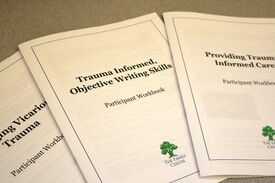Staff Skill Development
Empower your staff and volunteers to develop their skills with these key trainings. When time and capacity are limited, we can help. We’ve been supporting children, youth, and families for 80+ years. Learnings will continue to evolve alongside what happens in the community.
Plus, bringing in one of our facilitators means you can join your team, take off your ‘manager hat’, and learn alongside them.
You can start developing their interpersonal and soft skills with these professional development workshops.


